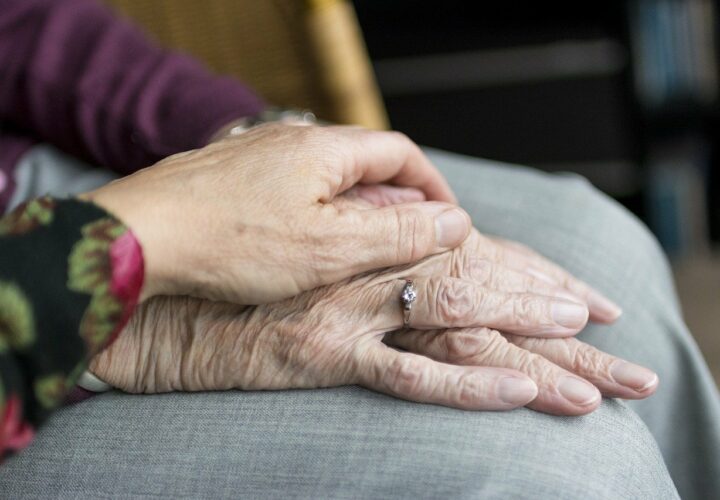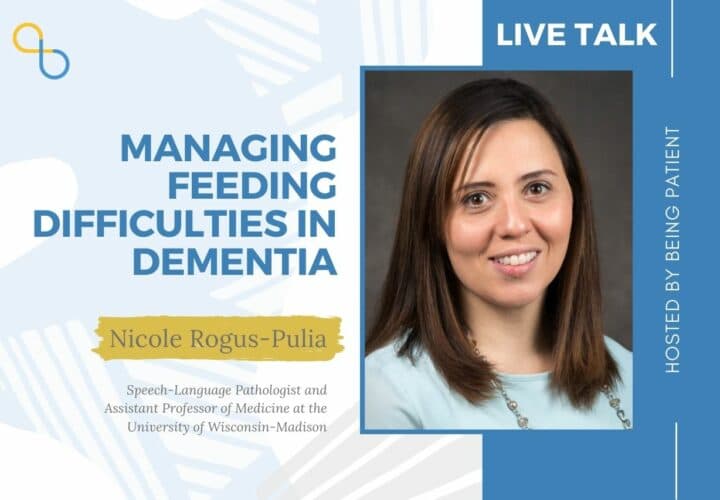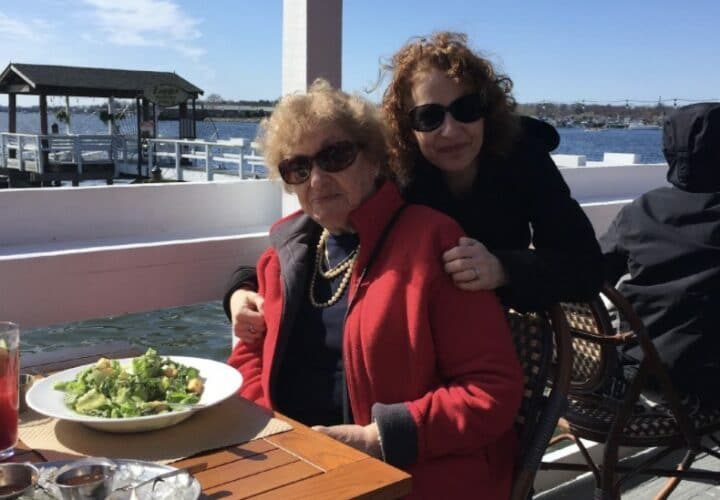Loss of appetite or stopping eating entirely is common among patients with late-stage Alzheimer’s. Why does it happen, and what can caregivers do?
A few months before Jasja De Smedt Kotterman’s mother died of Alzheimer’s at age 76, Kotterman found her mother staring vacantly at a meal, a plate of fruit that had been put in front of her two hours before. Her mother’s eating had slowed in the preceding weeks, but Kotterman and the nursing home support staff and doctors had not been any more alarmed by it than by any of her other declining functions. Kotterman eventually found out that it was due to a slow shrinking of the part of her brain that commands basic physical functions like swallowing. Additionally, Alzheimer’s affects the part of the brain that signals thirst and hunger, making it challenging for people to drink enough fluids. This manifested in other ways: she would chew her food for a long time, forgetting what to do once it was in her mouth. Kotterman’s story is just one example of the many reasons that people living with Alzheimer’s disease may stop eating.
“I almost felt as if she couldn’t figure out what to do with the food in her mouth,” Kotterman wrote. “She would chew it for a long time and then she seemed to be almost afraid to swallow. Next, she just refused all food and water.”
It’s not uncommon for Alzheimer’s patients to stop eating regular meals, or to suddenly begin to need a great deal of help in order to consume food. As for why people living with Alzheimer’s and related dementias stop eating, it’s not always due to Alzeimer’s disease’s memory-related symptoms.
Rather, it’s more likely a complex combination of causes, and the search for guidance and recourse to ensure the patient gets enough nourishment in spite of a refusal to eat may take some expert consult. In the meantime, here are a few things Alzheimer’s and dementia caregivers can do when their loved ones stop eating.
Reasons a person with dementia may stop eating
If you see your loved one living with Alzheimer’s disease avoiding eating meals or pushing food around on their plate, you are probably looking for advice, tips, and help about what to do next and not sure what has caused the problems. You will need to observe their behavior to figure out the cause and rebuild their health. There are multiple causes of Alzheimer’s patients losing interest in eating meals or stopping altogether.
There are physical causes, like loss of teeth, weak jaw muscles, or other mouth problems. Swallowing may have become challenging. Depression, which is common in dementia, along with memory loss, can lead to a loss of appetite and will to eat and drink. Oftentimes people with dementia have dental health problems but are unable to communicate their severity, which can contribute to pain while eating and food avoidance. Be sure to explore different causes and options for change and support and be willing to offer help at meal time.
When do Alzheimer’s patients stop eating entirely? In earlier stages, a loss in appetite or eating challenges may happen, but people living with dementia refusing to eat entirely is most common in late-stage dementia. People living with Alzheimer’s may also lose their appetite or begin refusing food when they are nearing the end of life care stage.
What can caregivers do to encourage an Alzheimer’s patient to eat?
It can be challenging as a caregiver to watch a loved one living with Alzheimer’s stop eating and drinking fluids and manage the associated health problems. Until late-stage dementia, some causes are less serious and solvable, like ill-fitting dentures, dental pain, or medication side effects.
Advice and tips for convincing someone to eat again or feeding them effectively depends on their reasons for challenges in the first place. If chewing is painful, some interventions can make eating and receiving fluids pleasant again. Some people with dementia can be coaxed back into eating if they’re given softer foods, because hard foods were simply too difficult to chew and swallow.
Building positive associations with meal time, based on things that bring your loved one joy, may help. Simple diet and nutrition changes can reignite someone’s interest in food and drink. Offer different food options and see how they respond.
At earlier stages, it’s possible to intervene as a caregiver and get the person living with dementia to eat and drink again. Here are some tips to get started. Sometimes a person’s food preferences have changed, and if you keep track of what foods elicit a positive reaction, you can offer those foods more often for a meal and convince them to eat more regularly.
Additionally, one piece of advice is to try feeding them different types of foods and see if anything increases their appetite. Serving food in smaller portions can help to not overwhelm the person and make eating seem easier. Similarly, don’t rush someone into eating meals quickly.
People with Alzheimer’s often eat slowly, so rushing loved ones will just discourage eating as a whole and contribute to the ongoing problem. Let them take their time. As the stages of dementia progress, the reluctance to eat can become more serious and less fixable with casual help, advice, and tips.
What happens when Alzheimer’s patients stop eating?
Refusal to eat and drink becomes an emergency situation in which you should call 911, seek help, and go to the doctor when your loved one exhibits delirium, high fever, or obvious belly pain.
Additionally, signs of serious dehydration are cause for a visit to the doctor. These include rare urination, dark yellow pee, sunken eyes, an elevated heart rate, and a dry tongue.
Even if the situation has not reached emergency levels yet, there are still important issues to consider when someone rarely eats or has serious issues with swallowing every day. Likely, they are not getting enough nutrition in their diet, which can lead to other health problems in this late stage. A doctor can consult at any stage of this process.
How long can Alzheimer’s patients live without eating?
According to Dr. Liz Sampson, an end-of-life care expert, once someone has fully stopped eating and drinking, it’s a possible sign that someone is nearing the end of life care stage with Alzheimer’s disease.
She told Being Patient: “If someone stops eating and drinking, the memory has become so bad that people don’t know what food is anymore, so to them, food in their mouth is like a foreign body. They might spit it out, not want to swallow it or forget how to swallow. When someone reaches that stage, that’s a sign that things are probably more imminent.”
It’s impossible to give an exact number of hours or days that someone with dementia can live without eating or drinking. If eating and drinking have stopped entirely, doctors may advise beginning end-of-life care. Feeding tubes and artificial nutrition are generally discouraged for people with severe Alzheimer’s disease as they may cause painful complications and aren’t shown to improve quality of life or longevity. Though it may be tempting to resort to a feeding tube support system for your loved one, it’s important to consider these recommendations during this difficult time.






Thank you. I am the caregiver of my mother who has Alzheimer’s. She’s 94. I read as much as I can. She eats breakfast. Very little dinner. Have a nurse in morning. Very challenging and heartbreaking for me.